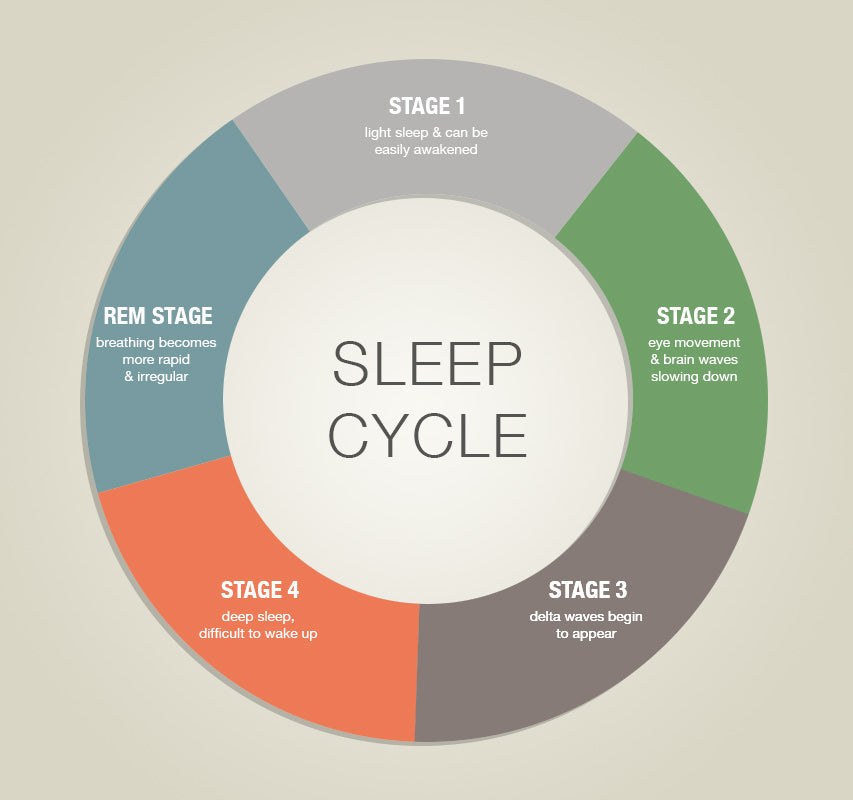
Sleep
The Sleep Cycle:
There are two different types of natural sleep cycles, the outer cycle (also known as the circadian rhythm) and the inner sleep cycle. Both have an effect on the quality of sleep.
i. Outer Cycle = Circadian Rhythm:
Our body's circadian rhythm is like our body clock. Our internal system for knowing what time it is without having to look at a clock. This is predominantly controlled by light. It can be externally influenced by things like travel to different time zones (jet lag), shift work, daylight savings, temperature or anything external that can wake you from your sleep (noises such as cars, partner snoring or a baby crying). Changes to the circadian rhythm directly affect the inner sleep cycles.
ii. Inner Cycle = 5 Stages of Sleep
The sleep cycle moves through different stages repeatedly during the night (or when you are asleep). Most people complete 3-5 sleep cycles per night if they are sleeping well and the stages can be broken down into:
Stage 1 - Light Sleep - which is more like the doorway to sleep
Stage 2 - Light sleep - where someone is easily awakened
Stage 3 - Deep sleep begins - this is where immune system healing is at its greatest. Delta brainwaves begin to be experienced as the person is totally unconscious.
Stage 4 Deep sleep - it is hard to awaken someone is this stage. Over 50% of brainwaves are delta which amongst many functions releases anti-aging hormones, releases of HGH to repair the musculoskeletal system, decreases cortisol levels (stress hormones), stimulates the pituitary gland to release melatonin and creates deep states of relaxation and healing.
Stage 5: REM (rapid eye movement) - where most dreaming occurs and where it is believed that stored negative emotions can be integrated and released.
The stages described above cycle through every one to two hours. What is important to understand is that phase 1 is not repeated unless your sleep is broken, therefore allowing extra time in the deep sleep and REM cycles, which means extra healing time! So, if you can’t get to sleep or your sleep is broken then stage 1 has to start all over again, preventing you from having enough time in the latter stages or possibly not reaching the healing stages at all. The immediate effects are noticed physically and mentally but over time if sleep is continually disrupted then it can have long term physiological effects.
If our circadian rhythm is affected externally or the body does not go through the inner sleep cycles at night, then it affects how your body heals and feels. For example, human growth hormone (HGH) is released in deep sleep which helps the body repair and build muscle, slows down the aging process, switches your metabolism to burn fat and boosts immunity. You can see how important sleep is for you, not just so you feel mentally refreshed but so your physical body can regenerate and function optimally.

Tips and Tricks for a good nights sleep:
• Try and go to bed and get up at the same time each day to support your circadian rhythm.
• Avoid overstimulation before bedtime (avoid TV, computers, phones, bright lights etc).
• Eat low carbohydrate meals during the day and especially at night• Avoid stimulants (ideally always) but especially after lunch and never within 3 hours of bedtime (especially caffeine, sugar, processed foods, nicotine).
• If you do need to eat close to bedtime, make it high protein and high fat.
• Exercise during the day but not too close to bedtime• Ensure you have positive thoughts in your head (meditate, affirmations, gratitude list, pray etc).
• Ensure you have a good mattress and contour pillow (if your spine is not supported then it can create tension and wake you up).
• Make sure your room is as dark as possible as light inhibits melatonin (use a face mask if it is not possible to block out all light) secretion which is your sleepy hormone.
• Seeing the sun rise and set is a great way to reset / maintain your circadian rhythm and assist with sleep• Minimise noise as much as possible (even if that means using ear plugs) so your sleep cycle is not disturbed.
• If you sleep with a snorer or restless sleeper then it may be best to move to your own bed for a while until you can re-establish your sleep cycle.
• If you do need to get up in the night use a torch rather than putting the lights on and fully "waking yourself up".
• Try some herbal remedies such as magnesium to promote muscle relaxation,valerian root which is sleep inducing and chamomile which is relaxing.
If you have addressed all of the above and are still having problems getting or staying asleep then talk to your doctor about trialling supplements such as melatonin for a short period to assist in inducing sleep.